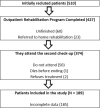Impact of cardiac rehabilitation on anxiety, depression, and health-related quality of life in cardiovascular patients
- PMID: 40540069
- PMCID: PMC12181594
- DOI: 10.1186/s43044-025-00658-8
Impact of cardiac rehabilitation on anxiety, depression, and health-related quality of life in cardiovascular patients
Abstract
Introduction: The study aimed to evaluate the effects of a cardiac rehabilitation program based on physical exercise and the promotion of healthy habits on anxiety, depression, and health-related quality of life in patients with cardiovascular conditions. Additionally, it sought to analyze the influence of baseline anxiety and depression levels on post-treatment health-related quality of life outcomes.
Methods: A longitudinal study was conducted with 189 patients who completed a structured cardiac rehabilitation program. Anxiety and depression were assessed using the Goldberg Anxiety and Depression Scale, while health-related quality of life was measured with the RAND-36 survey. Data were collected pre- and post-intervention. Statistical analyses included paired t tests for pre/post-comparisons and ANCOVA to evaluate the impact of initial anxiety and depression on health-related quality of life improvements.
Results: The cardiac rehabilitation program significantly reduced anxiety (mean difference = - 0.93, CI: - 1.42 to - 0.44, p < 0.001; Cohen's d = 0.35) and depression (mean difference = - 0.62, CI: - 0.99 to - 0.25, p < 0.001; Cohen's d = 0.32), with improvements observed across several health-related quality of life dimensions, including emotional well-being (p = 0.005) and energy/fatigue (p < 0.001). Baseline anxiety and depression levels influenced changes in specific health-related quality of life dimensions, such as social functioning and role limitations due to physical health (p < 0.05). Causal interpretations are limited by the observational design and absence of a control group.
Discussion: The results show an association between participation in cardiac rehabilitation programs and a reduction in anxiety and depression, as well as improved health-related quality of life in patients with cardiovascular disease. Baseline psychological status plays a key role in determining the magnitude of health-related quality of life improvements, highlighting the need for tailored interventions.
Keywords: Anxiety; Cardiac rehabilitation; Cardiovascular disease; Depression; Quality of life.
© 2025. The Author(s).
Conflict of interest statement
Declarations. Human ethics: The study was conducted in accordance with the Declaration of Helsinki and approved by the Medicines Research Ethics Committee of the Burgos and Soria Health Area (Ref. CEIm 2569) for studies involving humans. Consent to participate: Informed consent was obtained from all subjects involved in the study. Consent for publication: Not applicable. Competing interests: The authors declare no competing interests.
Similar articles
-
Exercise interventions and patient beliefs for people with hip, knee or hip and knee osteoarthritis: a mixed methods review.Cochrane Database Syst Rev. 2018 Apr 17;4(4):CD010842. doi: 10.1002/14651858.CD010842.pub2. Cochrane Database Syst Rev. 2018. PMID: 29664187 Free PMC article.
-
Specialist breast care nurses for support of women with breast cancer.Cochrane Database Syst Rev. 2021 Feb 3;2(2):CD005634. doi: 10.1002/14651858.CD005634.pub3. Cochrane Database Syst Rev. 2021. PMID: 34559420 Free PMC article.
-
Yoga for stroke rehabilitation.Cochrane Database Syst Rev. 2017 Dec 8;12(12):CD011483. doi: 10.1002/14651858.CD011483.pub2. Cochrane Database Syst Rev. 2017. PMID: 29220541 Free PMC article.
-
Home-based multidimensional survivorship programmes for breast cancer survivors.Cochrane Database Syst Rev. 2017 Aug 24;8(8):CD011152. doi: 10.1002/14651858.CD011152.pub2. Cochrane Database Syst Rev. 2017. PMID: 28836379 Free PMC article.
-
Music interventions for improving psychological and physical outcomes in people with cancer.Cochrane Database Syst Rev. 2021 Oct 12;10(10):CD006911. doi: 10.1002/14651858.CD006911.pub4. Cochrane Database Syst Rev. 2021. PMID: 34637527 Free PMC article.
References
-
- Bozkurt B, Fonarow GC, Goldberg LR, Guglin M, Josephson RA, Forman DE, Lin G, Lindenfeld J, O’Connor C, Panjrath G (2021) Cardiac rehabilitation for patients with heart failure: JACC expert panel. J Am Coll Cardiol 77(11):1454–1469 - PubMed
-
- Brown TM, Pack QR, Aberegg E, Brewer LC, Ford YR, Forman DE, Gathright EC, Khadanga S, Ozemek C, Thomas RJ (2024) Core components of cardiac rehabilitation programs: 2024 update: a scientific statement from the American Heart Association and the American Association of Cardiovascular and Pulmonary Rehabilitation. Circulation 150(18):e328–e347 - PubMed
-
- Child A, Sanders J, Sigel P, Hunter MS (2010) Meeting the psychological needs of cardiac patients: an integrated stepped-care approach within a cardiac rehabilitation setting. Br J Cardiol 17(4):175–179
-
- Patel DK, Duncan MS, Shah AS, Lindman BR, Greevy RA Jr, Savage PD, Whooley MA, Matheny ME, Freiberg MS, Bachmann JM (2019) Association of cardiac rehabilitation with decreased hospitalization and mortality risk after cardiac valve surgery. JAMA Cardiol 4(12):1250–1259. 10.1001/jamacardio.2019.4032 - PMC - PubMed
LinkOut - more resources
Full Text Sources

